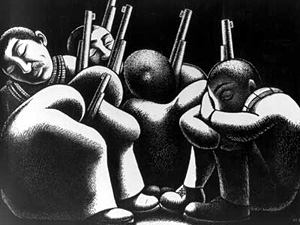 |
 |
 |
 Editorials | Opinions | October 2007 Editorials | Opinions | October 2007  
Are Mexican Soldiers Aiding Drug Smugglers on the Border?
 Allan Wall - PVNN Allan Wall - PVNN


| | Soldados Durmíendo (Sleeping Soldiers), a 1934 drawing by Máximo Pacheco |
Among the many problems on the US-Mexico border is that of reported Mexican military incursions onto the US side of the border. These incidents raise disturbing questions about US-Mexican relations and the two nations' wars on the drug cartels.

The evidence indicates that elements of the Mexican military are aiding drug smugglers on the border.

Such incursions have been reported for years by US law enforcement offices and by Mexican illegal aliens.

Both governments would prefer not to acknowledge the problem. When pressured, the US downplays it, while Mexican officials deny the incidents, or attribute them to accidental crossings or drug smugglers dressed as Mexican soldiers.

Much of the US-Mexican border is unguarded, trackless desert. So it's not surprising that from time to time a Mexican army vehicle or patrol might take a wrong turn and wind up north of the border.

Doubtless there have been some accidental crossings. But they wouldn't account for the bulk of the incidents, especially considering the reported behavior of these soldiers, which is sometimes aggressive.

As for the "smugglers disguised as soldiers" argument, there may be some cases of that too. But if that were the principal explanation, it could imply that (a) the Mexican Army can't secure its materiel stores, or (b) it can't control the border area, which is hardly reassuring.

A US Department of Homeland Security document in 2006 reported 216 such incursions from 1996-2006. There may be many more.

To begin with, why are there so many Mexican soldiers on the border, anyway? Is the border being militarized?

If the US put a Boy Scout with a water gun on the border, Mexican politicians would decry the "militarization of the border." Nevertheless, the Mexican side of the border is already militarized.

There are 11 Mexican military garrisons on the Mexican side of the US-Mexican border. Moving from west to east, these garrisons are located at Tecate, San Luis Rio Colorado, Sonoyta, Agua Prieta, Ciudad Juarez, Ojinaga, Palomas, Ciudad Acuna, Piedras Negras, Nuevo Laredo and Matamoros.

By the canons of international law, there's nothing wrong with it either. According to the treaties of Guadalupe-Hidalgo (1848) and the Gadsden Purchase Treaty (1853), which established the current US-Mexico border, each country reserves the right to fortify any part of its side of the border.

Nature abhors a vacuum. Both governments have allowed their common border to become a rather lawless place. I was almost attacked on the border (in an urban area) and literally made a run for the border to escape. Robbery, rape and murder are standard fare on the border, along with the drug smuggling, illegal immigration, and the hundreds of illegal aliens who perish each year on the border.

Add to the mix corrupt Mexican soldiers aiding drug smugglers and you have a real prescription for disaster.

Traditionally, the Mexican military has been regarded as less corrupt as local Mexican police. That's why President Calderon is using the military as the spearhead in his war on the cartels, and many young soldiers have died fighting drug cartels.

Nevertheless, the military has its corruption too. Plenty of military officers, including generals, have been busted for drug corruption over the years. And that's only the ones who've been caught.

The most high-profile case was that of Mexico's anti-cartel czar General Gutierrez Rebollo, who seemed to be doing such an effective job of nabbing drug traffickers. It turned out though, that he was going after one drug cartel while in the service of another. The general was arrested, convicted and sentenced to 71 years in the hoosegow. (That was back in 1997.)

It's also a known fact that deserters from the underpaid ranks of the Mexican military (which has a high desertion rate) have joined the cartels, including some crack troops trained by the USA.

So it's not at all farfetched to assert that Mexican military elements on the border are working for the cartels in smuggling operations. In fact, it would be surprising if such things weren't going on.

Unsurprisingly, ugly and dangerous incidents involving intruding Mexican soldiers and US border patrol (and other law enforcement) agents have already occurred. Border Patrol agents have already been fired upon in such incidents (and they are usually out gunned by Mexican soldiers crossing the border.)

It's not a good situation. Yet neither government seems to want to do anything about it.
 Allan Wall is an American citizen who has been teaching English in Mexico since 1991, and writing articles about various aspects of Mexico and Mexican society for the past decade. Some of these articles are about Mexico's political scene, history and culture, tourism, and Mexican emigration as viewed from south of the border, which you can read on his website at AllanWall.net. Allan Wall is an American citizen who has been teaching English in Mexico since 1991, and writing articles about various aspects of Mexico and Mexican society for the past decade. Some of these articles are about Mexico's political scene, history and culture, tourism, and Mexican emigration as viewed from south of the border, which you can read on his website at AllanWall.net.

Click HERE for more articles by Allan Wall. | 
 | |
 |



